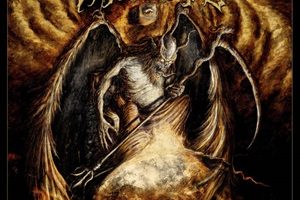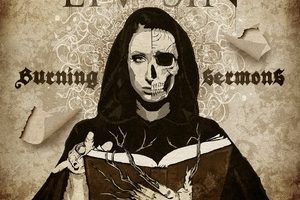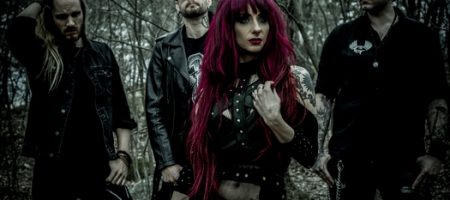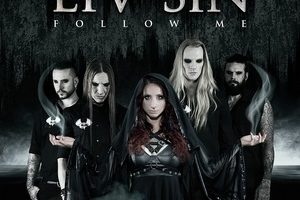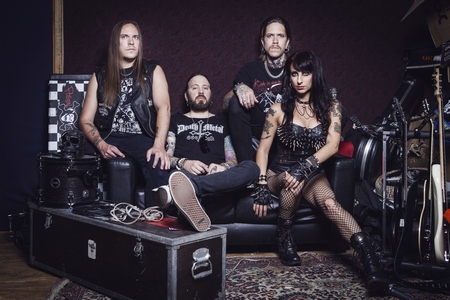LiV SiN – Darkness into the Light
Tuesday, 3rd January 2023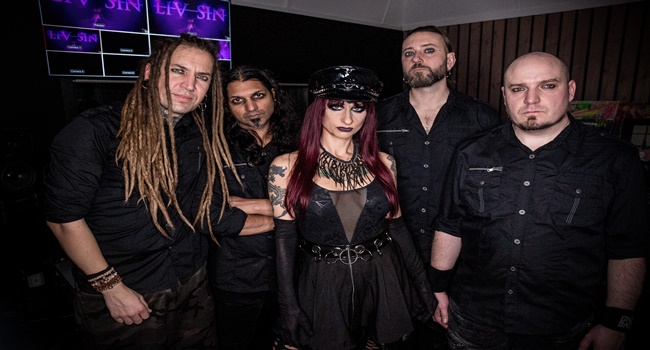
LiV SiN is the outfit vocalist Liv Jagrell developed following the demise of Sister Sin – and it’s been a slow climb to establish credibility and an audience for this outfit. Moving onto Mighty Music with their third album KaliYuga, the group has switched out a couple of members as well as expanded their horizons as far as tones/sounds that could garner more of a modern fan base beyond the traditional melodic hard rock/metal followers. We reached out to Liv on Zoom recently to find out why the member changes took place, the work behind the new album, special guest and producer choices, thoughts on what success means today, memories surrounding the summer Sister Sin reunion shows, plus future hopes including possible North American tour plans.
Dead Rhetoric: In the time period between records, you’ve had a couple of lineup changes with Liv Sin. What circumstances took place for these changes, and what do you think the new members Daniel Skoglund (bass) and Jay Matharu (guitar) bring to the band that make things stronger or different than before?
Liv Jagrell: The first change, I lost the bass guitarist Tommie (Winther) and Chris (Bertzell) the guitar player. It was at the same time, it was mutual. We had a little bit different idea, musically. And how to proceed. I am very dedicated, and when you reach a certain age it’s harder to go out and play like you are twenty. I do understand that. But if you want to be in a band that wants to get out and play, then you have to try to do that anyway. If it doesn’t work, it doesn’t work. It is much easier in your twenties and thirties to find people to play with, everybody wants to go out and live their lives. Maybe you have a family, maybe you want to own a house or have a car. You can’t afford to live on that small amount of money that it requires when you are on tour, for example. I have planned my whole life around being able to go out and tour, and not put myself in that. I don’t have a car for that reason, I don’t want to buy a house for that reason, I just stay as minimalistic as possible, or live as minimalistic as possible so that I know I can survive on tour if a tour comes up.
And it’s not easy – some tours give you a little bit of money, some tours there isn’t a lot of money, and hopefully one day a tour can bring you the money that you really can survive on. Today’s musician in bands, they struggle with this all the time. All the extra work you have to do with social media, you have to promote yourself all the time. Sometimes it’s overwhelming, and sometimes it doesn’t work. I am totally aware of this and fine with this. It’s why we separated.
Danny used to be our driver and our merch guy, but we knew he also played bass. He knows everything about the band. He started when Tommie couldn’t do the shows right before COVID-19 in Japan, he stepped in and knew a lot of our songs. And then it took a little more time to find Jay. He’s a really great guitar player, he was also friends with Per, the drummer who works as a drum teacher at the same school. He was there for a season, and when we were in need of a guitar player, he was one of the first people we asked. In the beginning, he was like, no – I am out of doing thing with bands. He wanted to do some solos on the album. Patrick the main songwriter with myself, Patrick is a rhythm guitar player, he didn’t want to do the solos. Jay wrote some of the solos, but he wrote them in mind that he wasn’t going to be the one to play them live. Then we asked him when we were in the studio if he wanted to join us in the band, he found it was really nice with us. He now has to play those solos. He definitely brings another touch to the band – he comes from a more Eastern side; he has another sound to his playing. He brings that into our music. It seems a bit unnatural to our Western ears to have those Indian touches and notes there, but they are nice. A new element into the band.
Dead Rhetoric: KaliYuga is the third album – referencing the fourth ‘Yuga’ in Hinduism, the present age era full of conflict and sin. How would you assess the recording and songwriting process for this set of material – as well as the lyrical themes you tackled this time?
Jagrell: The songwriting, when we started writing songs in 2020, we didn’t plan to do it then. I was planning on having a break. We lost members, I was going on a reunion with Sister Sin, and then I was going to pick up with LiV SiN. Well, the reunion shows couldn’t happen because of COVID at that time, we were rehearsing with Sister Sin for these summer festivals. What am I going to do now? We decided to write new music like every other band, what can you do when you can’t be on tour – at least you can be creating music. We started to meet up, in the beginning it was me, Per, and Patrick, trying out some riffs. And then we started to send stuff to each other when we couldn’t meet up.
We took much more time to write this album because of COVID. We didn’t have a deadline; also, we were still looking for a label. We could experiment more, develop the sound more, try different tunings. We went back and forth with the tunings, to find something else. The songwriting process was definitely longer. Before we would have two and a half months where we would need ten songs. And now we had no deadlines, so we had more ideas and songs to choose from. We definitely played around with things much more. We were extra creative because we had to get things out. Some of the vocals I was a little bit crazier, I will totally admit that – but it was very fun. With the keyboard arrangements, we did much more than we’ve ever done before. It was nice to bring those elements out as well.
You can see the frustration from COVID in the lyrics as well. My lyrics are always a little bit dark, but I think this time they are even darker. Somehow, I get my frustrations out when I write the lyrics. I’m a much nicer person. I have a hard time writing cheerful lyrics, I have not found a way to do that. My lyrics express some kind of desperation, some kind of anxiety, some kind of frustration. There is a lot of that on the record. My inner turmoil going through the uncertainty as a musician going through COVID. It’s something that is projected in my lyrics.
Dead Rhetoric: Working with seasoned musicians as producers like Simon Johansson (Wolf) and Mike Wead (King Diamond/Mercyful Fate) for this record, what touches or insights do they provide to make the final record that much better? Are there specific areas that they concentrated on to make things easier for yourselves as musicians?
Jagrell: I think first of all, Mike from King Diamond/Mercyful Fate, he brings a lot of experience, fun stories, and good times. He was very easy to work with. Simon is also very easy to work with, so they both brought in a kind of calmness to our chaos. They would be like ‘ah, just do another take’ with a calm environment, very cool dudes, no rush. I think we needed that, because I can be very intense, Per can be very intense as well. Patrick is a bit more laid-back. They brought a lot of that into the music. They let us do a lot of what we just wanted, since they acted more like recording students, they didn’t do as much producing as we did that ourselves. Of course, when I was a little bit too crazy, Mike would say, ‘do you think you are really going to do that in that song?’. In the end, he thought it was a good idea. They had some input, but most of the time they let us do what we wanted. We were able to make it work together.
Dead Rhetoric: How did the three guest appearances come about for “D.E.R.”? Have you always been followers of their work?
Jagrell: Absolutely. Zak Tell from Clawhammer, Per the drummer has always been a big fan. He loves the band; I was very agreeable. Eleine is a friend of mine, we wanted another female in the song. She was the first person I was thinking about. And then we had Wenderson D’Paula, he has a theatrical voice that is different than mine. We toured together with him in Spain, we connected, and I thought it would be cool if he would join us as well.
Dead Rhetoric: You also said you were working on this record without a deal on the table – why did you sign with Mighty Music, and where do you see the differences with this label versus Despotz over the last two records?
Jagrell: First of all, I split with Despotz right before COVID. It was really hard to find any label, so we thought we were originally going to just release this album ourselves. But then, a fan helped us out, he introduced me to Michael at Mighty Music. He helped us find a label that wanted to sign the band. We are very happy with that. Everything else with COVID now, we were supposed to release this in the summer of 2022, we ended up having to postpone the release until January. The situation for all these bands, agents, labels right now, it’s tough so we are working with what we have right now. It feels good to finally have the album out.
Dead Rhetoric: How did it feel to finally go back on stage with those Sister Sin reunion shows this past summer?
Jagrell: That was amazing, a lot of fun. It was like we never stopped. We had a real blast together. Definitely it’s made us all very sentimental. It was so much fun. It made me even more certain that this is where I want to be, that I want to be on stage even more focused. I can’t wait to do this with LiV SiN. If there are more shows, Sister Sin may take on some more shows – but it’s not going to be a full reunion. The rest of the guys, they have a nice, normal life with houses, children, jobs that they care about. To do a show here and there, a festival maybe, that is still a possibility.
Dead Rhetoric: What do you consider some of the biggest challenges Liv Sin faces at this point in your career – and do you see major differences or parallels between the career trajectory of Sister Sin versus how things are going with Liv Sin?
Jagrell: Definitely. It feels like things were much easier with Sister Sin. Because it was a bit easier when we started out, we had Victory Records, and they are a pretty huge label. They had a lot of marketing, they offered us tour support, they gave us a lot of opportunities. Today, the record labels don’t have the same resources available. I feel like it was easier once you got the record label back then to know they would do this and this, and now you don’t know that. You can release a record, but you don’t have any shows to play, any booking agent, you have social media, you have to do a lot yourself. We didn’t have to do that; Victory was able to do everything for us.
It was more like you could take those steps, if you tour you will grow. These steps today, they are not there anymore. Life can go in so many different ways. It feels like it’s more interesting how musicians will handle these steps in terms of growing today. With Sister Sin we got attention, respect, we were able to play a lot. With LiV SiN, I haven’t gotten to that point to build it up the same with the respect, or the same audience. Of course, it’s harder. With LiV SiN, we have had smaller labels. It was easier to get attention, now there are so many bands, you have to be constantly out there to get that attention. People will forget, you have to find ways to get their attention and I find that is very hard. If you can connect with the fans, it’s great. We have our Patreon, we have live streaming, we hang out with the fans more than before.
Dead Rhetoric: When you think about the concept of success, what does that word mean to you as far as being a musician – and has that definition changed from your initial years getting into the business versus today?
Jagrell: I don’t think so. My goal has always been to write music, play music, play live, and live off that. Especially growing up and playing live. Before I did not like the recording bit, I hated the recording studio. I would have to do this to be on stage. The stage is my life, that’s where I can feel the connection with the audience and in the studio, you don’t have that. But now, when I do more of the songwriting myself, the lyrics, I have a home studio doing my own music, playing around making songs, I feel more comfortable with that. I enjoy the songwriting process now.
Otherwise, the meaning of success is still the same. I want to be able to live off playing music or writing music, a combination of both. That is success for me.
Dead Rhetoric: How would you assess the state of the hard rock/metal scene globally? What aspects do you enjoy most, and what areas (if any) do you believe need to be modified or improved upon?
Jagrell: That is a hard question. Everything is weird, everybody is trying to play out at the same time and there isn’t enough of an audience for all the bands to play to. I don’t know how to change that. I feel like the music business is in a weird place right now, we are trying to find different ways to grow as labels, booking agents and bands. I feel like the situation has changed. We had streaming live shows, and you can stream for people on the other side of the world, and that is a good thing. We need to work even more on those things to see what we can do with the technology in a good way, and not only for attention or likes or followers, but just for more of the bands and fans to get closer together.
As for the live part, I wish it would come back to normal again, more of a live circle. It used to be a good circle, and it isn’t there anymore. I would like to get back to a recording/touring cycle, but we might not find that again. Time will tell how to figure that out. I feel like what’s lacking today is all that matters is likes or followers all the time. For me, I don’t want to be things to be about how many times I post something as an artist. I want it to be about the live shows that I do, the recordings that I do, that makes me as an artist. I may have to work around this with social media to find a balance around this.
Dead Rhetoric: What’s on the agenda for things related to Liv Sin over the next year or so to support the new release? Any special guest appearances in the pipeline to look forward to as well?
Jagrell: Not right now, but it would be nice to do a guest appearance. We are always looking around for other people to work with, but at the moment we are focusing on getting the album out and trying to get out on tour. Try to get shows again, that is the main concern and main obstacle right now. There are so many bands now and there is a line waiting. It’s like a traffic jam with bands that want to go out and tour, and we are not at the front of the line. We are way back here, and you have to wait for the other bands to go first. We will get some shows, get a tour, come out and play again. I want to come back to North America; it’s been a long time since being there. Maybe within a year or two we can be there.











